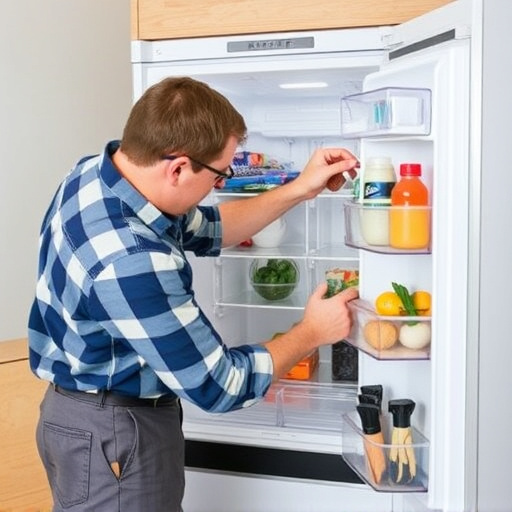Refrigerator repair is crucial for homeowners to maintain functional kitchen appliances. Common issues include temperature problems, leaking, and strange noises, which should be addressed promptly. Basic troubleshooting can help identify faulty parts like thermostats or seals, but persistent issues require professional intervention to prevent further damage. Before calling a pro, check power supply, thermostat settings, door sealing, and condensate drains. Ice maker and water dispenser problems can often be fixed with simple steps like filter cleaning and secure connections. Strange noises and vibration may indicate loose parts, damaged door seals, or motor issues needing professional repair. Digital control malfunctions should start with basic troubleshooting and potentially replacing the display.
“Keep your cool with our comprehensive guide to common refrigerator problems and their solutions. From freezing food instead of chilling it, to ice makers that won’t turn on or leaks from the water dispenser, we break down potential malfunctions and offer easy-to-follow troubleshooting steps. Learn how to navigate digital controls, fix unusual noises, and prevent future issues with expert advice tailored for your refrigerator repair needs.”
- Identifying Common Refrigerator Malfunctions
- Troubleshooting No Cooling: Causes and Fixes
- Addressing Ice Maker Issues
- Leaks and Water Dispenser Problems: Solutions
- Odd Noises and Vibration: What to Check
- Digital Controls and Display Malfunctions: A Guide
Identifying Common Refrigerator Malfunctions
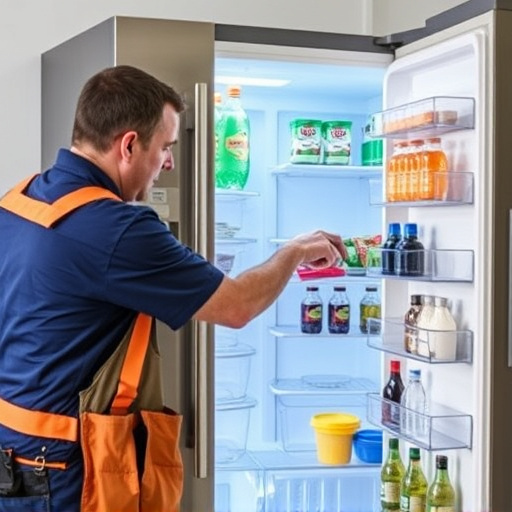
Refrigerators are essential appliances in any kitchen, making it crucial to recognize common issues that may arise and understand basic refrigerator repair methods. Some typical malfunctions include temperature control problems, where the fridge either fails to cool adequately or maintains abnormally low temperatures. This could be due to faulty thermostats, evaporator coils, or fan motors. Another frequent issue is leaking, which can result from damaged seals or water dispenser components.
Additionally, strange noises, such as grinding or rattling sounds, might indicate issues with the motor or other mechanical parts requiring attention. Notifying a professional for refrigerator repair is recommended if these problems persist, ensuring efficient troubleshooting and minimizing potential damage to this vital kitchen equipment.
Troubleshooting No Cooling: Causes and Fixes
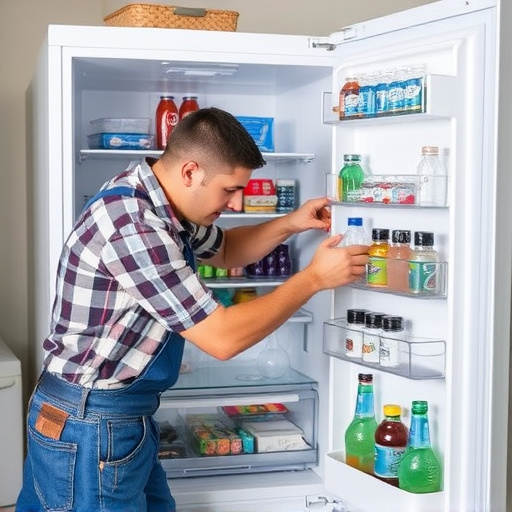
If your refrigerator isn’t cooling properly, it can be frustrating, but there are several common causes and easy fixes to consider before calling a professional Refrigerator Repair service. The first step is to check the power supply; ensure the appliance is plugged in securely and that the circuit breaker hasn’t tripped or the fuse hasn’t blown. Sometimes, a simple reset of the thermostat can resolve the issue, as temperature settings may have been accidentally adjusted. It’s also crucial to inspect the doors for proper sealing; even a slight gap can cause the cold air to escape, leading to inadequate cooling. Regularly cleaning the coils at the back or bottom of the unit and ensuring the condensate drain is clear of debris are maintenance practices that can prevent future problems.
In some cases, the compressor might be the culprit. The compressor is responsible for circulating refrigerant and producing cool air, so if it malfunctions, your fridge won’t cool effectively. Signs of a malfunctioning compressor include unusual noises coming from the unit and a persistent warm temperature inside the refrigerator. If you suspect this issue, it’s best to consult a Refrigerator Repair expert, as repairing or replacing the compressor typically requires specialized knowledge and tools.
Addressing Ice Maker Issues
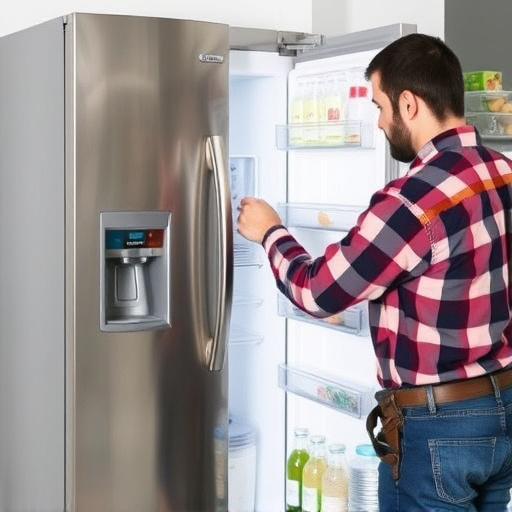
Ice maker issues are common refrigerator problems that can be frustrating for homeowners. If your ice maker isn’t working, start by checking the power source and ensuring it’s plugged in securely. Sometimes, a simple reset can fix the issue. Unplug the refrigerator from the power outlet for a few minutes, then plug it back in and wait for the ice maker to restart.
Another common problem is a blocked or dirty water filter. Regularly cleaning or replacing the filter according to your refrigerator’s manual can prevent clogs that disrupt the water flow to the ice maker. If the filter isn’t the issue, inspect the ice maker’s arms and sensors for any debris or buildup. A thorough cleaning might be needed to restore proper ice formation and discharge. For more persistent problems, consider seeking professional refrigerator repair services.
Leaks and Water Dispenser Problems: Solutions
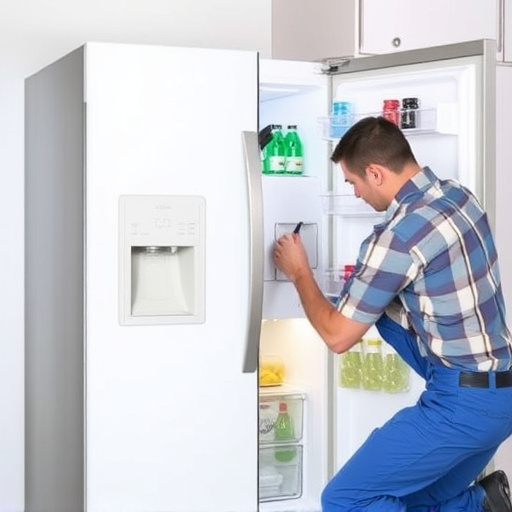
If your refrigerator is leaking water, the first step is to identify the source of the leak. Check the water dispenser and its connections for any obvious signs of damage or wear. A loose connection or a damaged hose can cause leaks, so replacing these parts may be an easy fix. If the issue persists, it could be a seal problem around the door or a malfunctioning ice maker. In such cases, professional refrigerator repair services should be consulted to diagnose and fix the issue, ensuring your food stays fresh and safe.
For water dispenser problems, such as no water flow or cloudy water, the issue often lies with the filter. Regularly replacing the water filter is crucial for maintaining optimal performance. Neglecting this simple maintenance task can lead to various problems, including leaks caused by a clogged or damaged filter. Additionally, check the settings on your refrigerator’s control panel; ensure the water dispenser function is enabled and adjusted correctly.
Odd Noises and Vibration: What to Check
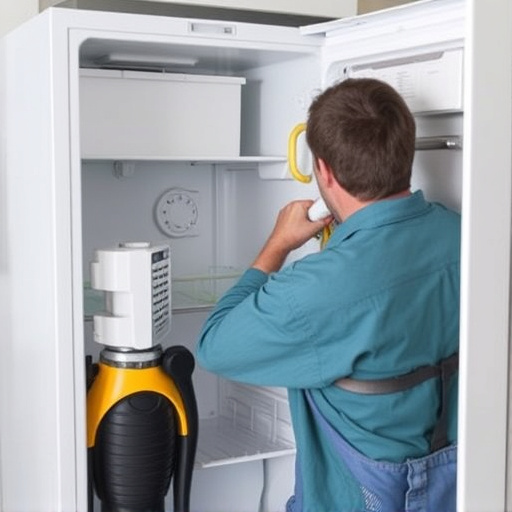
If your refrigerator is making strange noises or vibrating excessively, it could indicate several potential issues. Start by checking if there are any loose parts, such as shelves or drawers, that might be causing the disturbance. Secure any loose items and ensure they’re properly aligned. Next, examine the door seals; damaged or worn-out seals can lead to poor performance and unusual sounds. Consider replacing them if they show signs of tearing or aging. It’s also essential to look into the motor and fan system. A malfunctioning motor or blocked fan can cause vibrations and strange noises. Regular cleaning and ensuring proper airflow around the refrigerator can often resolve these issues.
Additionally, pay attention to any unusual grinding or clicking sounds, which might suggest problems with the door hinges or the ice maker mechanism. Lubricating hinges can fix minor friction-related issues. If the issue persists, it could be a sign of worn-out parts requiring professional refrigerator repair.
Digital Controls and Display Malfunctions: A Guide
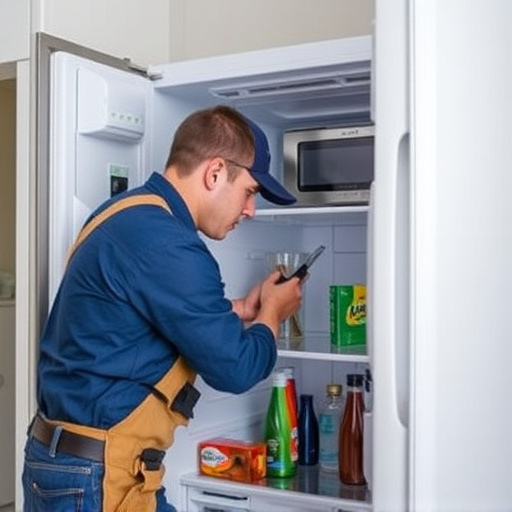
If your refrigerator’s digital controls and display are malfunctioning, it can be frustrating but is a common issue that can often be resolved with some simple troubleshooting. Start by checking power supply to ensure the fridge is plugged in properly and the outlet is functional. Sometimes, a simple reset of the control panel can fix intermittent issues; try unplugging the refrigerator for a minute then plugging it back in and initializing the settings again.
If the display remains blank or shows error codes, there might be a problem with the display unit itself. Refer to your owner’s manual for model-specific troubleshooting tips or consult online resources dedicated to refrigerator repair. Replacing a faulty display could be more cost-effective than you think, making it a good first step in diagnosing and fixing digital control malfunctions.
Understanding common refrigerator problems and their solutions is a valuable skill for any homeowner. By familiarizing yourself with issues like no cooling, ice maker malfunctions, leaks, odd noises, and digital control glitches, you can effectively troubleshoot and even prevent major breakdowns. Armed with this knowledge, you’re better equipped to maintain your fridge, ensuring it remains the heart of your kitchen – cool, efficient, and reliable – for years to come. For minor repairs, many common refrigerator problems have simple fixes that can be easily addressed at home. However, if issues persist or involve complex components, don’t hesitate to consult a professional refrigerator repair service.
